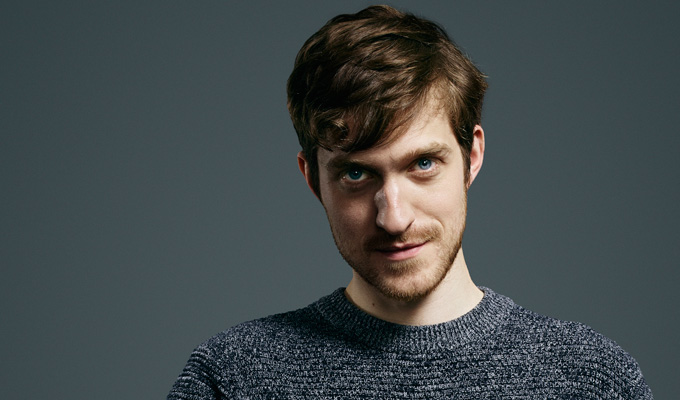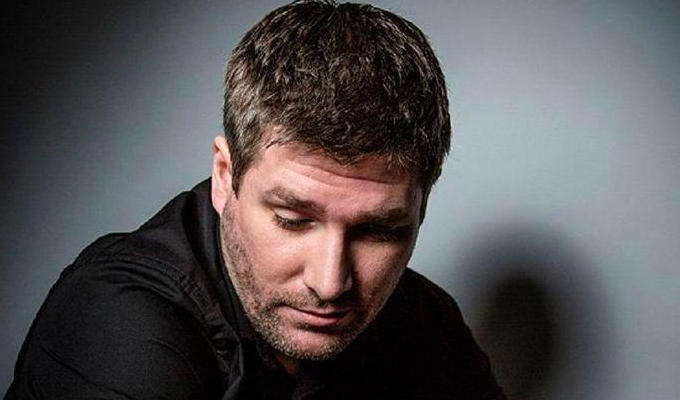Earning a fortune; living like a pauper
In the second extract from his memoirs, Simon Day recalls his time on Saturday Zoo
In 1993 Jonathan Ross’ production company, Channel X, embarked on the glorious folly that was Saturday Zoo, a music and comedy show to be broadcast on Channel Four at ten o’clock sharp on Saturday nights. Jonathan was hosting and there was to be a big-name guest every week; during the run these included Danny DeVito, Christopher Walken and Jean-Claude Van Damme (big enough for you?).
Channel X also hired a fantastic array of comic talent to appear, among whom were Steve Coogan, Rebecca Front, Patrick Marber, me, John Thomson, Roland Rivron, Kevin Day, Graham Fellows and Mark Thomas – plus Denis Leary, who appeared in filmed segments. Among the writers were David Quantick and Geoff Deane. Various script editors came and went, including Steve Punt and an old bloke who’d worked with Peter Cook and Dudley Moore. Addison Cresswell, the enfant terrible of comedy agents, withdrew his acts on the grounds that Saturday Zoo was a ‘chicken with its head cut off’ show. He was probably right.
All the comics were paid £1,000 a week regardless of whether or not they appeared. Appearing one week didn’t necessarily mean you’d appear the next, and some performers who couldn’t get a look- in just gave up after a while and took the money.
Sketches were written, ideas thrown up and characters discussed in a mess of egos, backbiting, pure joy and general tomfoolery. The only lasting thing to come out of it was Coogan’s character Paul Calf, which was rightly seen as brilliant and became an instant classic. Calf appeared every other week over the ten-week run, while other characters came and went.
The producer was a chubby-cheeked Kenton Allen, who later became a hugely successful comedy producer. On Saturday Zoo, however, he tried to please all the people all the time and came unstuck. He was under a lot of pressure – not just from a stream of fame-hungry comedians but also from Channel Four, who weren’t getting the ratings they’d hoped for. Allen really was the man in the middle and by the end of the series his leopard-skin waistcoat was looking a bit threadbare.
The show was an hour long and live – yes, live. It was scary: if you fucked up you couldn’t go back and do it again; if you swore or overran you were in trouble. Handsome devil and all-round muso Sean Rowley was in charge of booking the bands and he did us all proud. Among others we had Stereo MCs, Suzanne Vega and PM Dawn (and they were weird, man). Rowley wore a fur coat with drainpipes and loafers but I didn’t let that put me off. He was the man who later founded Guilty Pleasures, a truly broad musical church where nothing is naff, and our shared love of music led to a firm friendship that continues to this day.
The comic line-up fell into three camps: focussed, talented and hard-working (Steve Coogan, Patrick Marber and Rebecca Front); unfocussed, talented and soft-working (me and John Thomson); and unfocussed (Roland Rivron). By the way, if you want to see Roland at his best try to find his Set of Six series – it’s absolutely brilliant, one of my favourite shows ever.
I was, by this stage of my life, using cocaine regularly. I’d also started taking ecstasy and sweating in darkened rooms drinking water. I was a weekend raver and I loved it: being able to dance on your own all night and hug strangers – what’s not to like? Here was a drug that actually did what it said on the tin, if only for a limited period.
I remember at one production meeting a sketch was discussed in which Patrick Marber was to appear as a raver. I spoke up immediately, my argument being that Marber couldn’t portray an E monkey when he’d never taken the drug. John kept telling me to be quiet but I wouldn’t have it. As the meeting broke up I piped up again: ‘I took three Es last Thursday night – why can’t I play the part?’ I was deadly serious: to me comedy characters have to be based in strict reality; that was my point, however stupidly I put it. I knew Marber wouldn’t play the part properly and he didn’t – he was awful. I kept going on about it but people didn’t get what I was on about. (I don’t think he’ll be suing me over these remarks: he’s since gone on to bigger and better things.)
Throughout my career people have misjudged my deep seriousness about comedy in general. I’ve been written off as a chump, as someone who doesn’t know what he’s doing. I suppose I was a bit all over the place in those days.
One day the political stand-up Mark Thomas was working in one room, looking at me and John through the window in another. We were looking back at him. I kept saying to John, ‘He’s a bit of a weirdo, isn’t he?’
‘Don’t look,’ said John. ‘He’s watching us.’
Later on Mark came up to John and said, ‘Simon is mad, isn’t he? Quietly mad.’
Obviously it’s anecdotes like this that will push this book right to the top of the bestsellers lists worldwide . . . I was certainly very up at this stage, though. I was finally having a laugh and a career at the same time: I was mad for it and it was mad for me.
I was single at the time and living in a room in a large house in Blackheath. The owners were artists and there was a tree in the living room that formed part of the building’s structure. There was ornate carving everywhere, and trompe-l’oeil panels; it was amazing. A bit damp but you can’t have it all. My tiny space at the top of the house did me fine.
Obviously my main plan during the course of Saturday Zoo was to appear as a series of groundbreaking, hilarious comedy characters, the only trouble being that I had no one to help me achieve this. My old sparring partner Mark Swan was incommunicado. I was on my own.
In addition to performing as much as possible Patrick Marber wrote, directed and fine-tuned Steve’s performance as Paul Calf. They were sticklers, the pair of them, who left nothing to chance and the results were there for all to see. I, meanwhile, was busy befriending Jonathan Ross – going back to his house, smoking fags and forcing him to play Steely Dan at three in the morning.
I was totally captivated by Ross. This was still the early Nineties, remember, and before celebrity had become a derided, hollow boat in which anyone could sail provided they debased themselves in some way. Famous people were still fairly exotic and respected, and Ross was the boy-king. Intelligent and charismatic, he’d met a lot of famous people and had funny little stories about some of them. Thinking about it now I realise he never slagged anyone off – he was always positive about everyone – unlike me, who would coat people off at the drop of a hat.
It was all quite close-knit; he didn’t have folk back from the pub. He was and is, basically, a family man, and his mum was always there and his father-in-law too. It wasn’t very rock ‘n’ roll – we just played charades and stuff. (I was horrified when I went through his CDs one night and found mainly Disney and musical-theatre compilations. Now I have kids of my own I realise why, but at the time I thought he might be a homosexualist on the side.)
I look back on that time as being really exciting and fun: I was getting paid to dress up and piss about, I met loads of new people, everyone told me I was funny and at the end of the night we fell into cabs and went home.
Part of me was desperate to hang out in nice houses in nice areas with people who were going somewhere. I’d been skint for so long I thought I’d had my chips, yet here I was hanging out with various top bananas. Of course, at the end of the night I’d return to my little room in Blackheath and think, I’m earning a fortune – why haven’t I rented a proper flat with a garden and a dishwasher? Why haven’t I got a little mortgage together? Why do I claim to like living in this room? It’s fucking tiny! Where’s my car? Where’s my accountant? I didn’t even own a telly and yet earlier in the evening I’d been helping Jean-Claude Van Damme use the fag machine, laughing with Danny DeVito as he said something I couldn’t quite understand and drinking herbal tea with Suzanne Vega. I’d look around and think, You’re still a fuck-up: don’t kid yourself; don’t get any ideas. Then, after my come down was over, I’d be cock of the walk once again.
- From Comedy and Error: They Really Were Marvellous Times by Simon Day, published by Simon & Schuster priced £18.99. Click here to order from Amazon for £9.50.
Click here to read yesterday's extract about him starting in comedy. Final extract tomorrow.
Published: 28 Jun 2011






